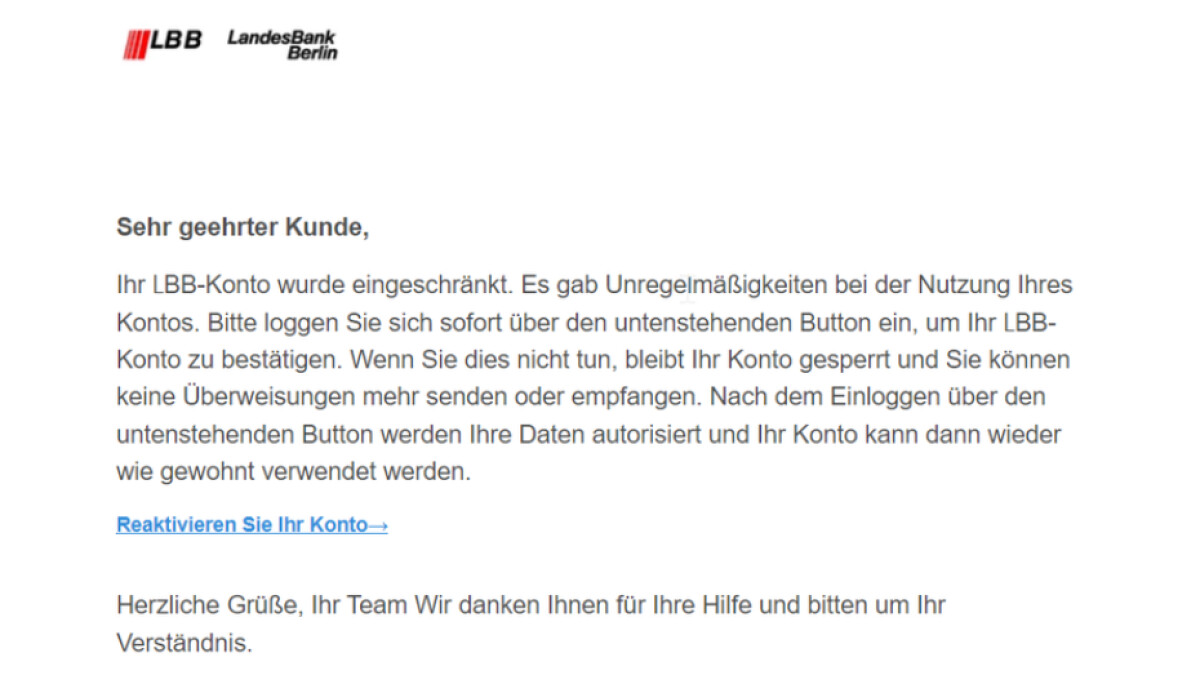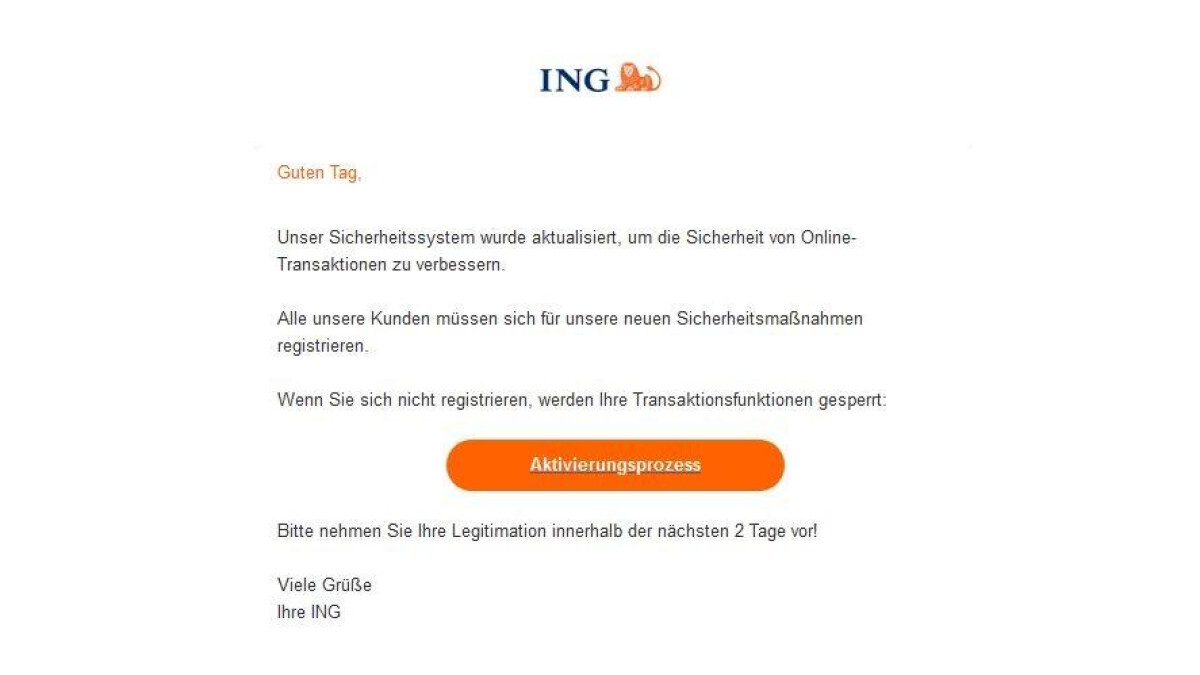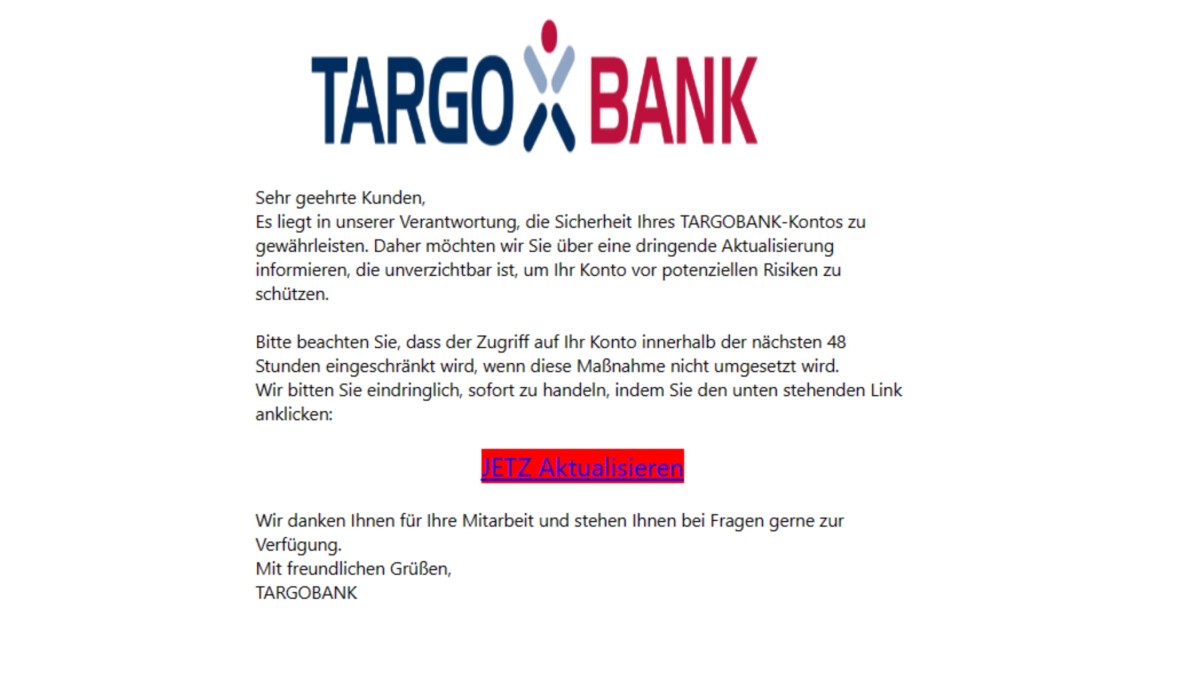Cybercriminals are targeting your bank details with a large-scale phishing attack. We’ll tell you which banks are affected and how you can protect yourself.
Three banks are affected by a wave of phishing. (Source: weerapat/depositphotos.com)
- Cybercriminals want to lure you into a trap with phishing.
- The customers of three banks are affected by the wave of fraud.
- This is how you recognize the scam and stay safe.
LBB, ING and Targobank in the phishing sights
Account reactivation at Landesbank Berlin
New security measures at ING
Update with deadline at Targobank
Simple signs: How to recognize every phishing email
What do criminals achieve with phishing attacks?
The most popular target for cybercriminals is still your bank details. They repeatedly try to obtain this sensitive information using a variety of pretexts. Phishing emails are usually used that appear to come from your bank. In reality, however, it is a blatant attempt at fraud.
In order to significantly increase their chances of success, the fraudsters are currently using a large-scale phishing attack and are targeting several banks. If you have recently received an email from your bank, you should be particularly careful and not blindly trust the content.
LBB, ING and Targobank in the phishing sights
You are affected by the wave of fraud if you have an account with Targobank, Landesbank Berlin or ING. The fraudulent emails either mention an update process or an account reactivation, as the consumer advice center reports. In any case, the claim is not true. The fakes can be identified as such based on details.
Account reactivation at Landesbank Berlin The Landesbank Berlin is affected by phishing. (Source: consumer advice center)
The attempted fraud in the name of Landesbank Berlin is sent with the subject “Your access has been restricted – reactivation is required”. This restriction allegedly occurred due to irregularities in the use of your account.
In order to remove the block, you must log in to your online banking using the attached link. If you do this, your login details will be forwarded to the fraudsters and they can then easily plunder your bank account.
New security measures at ING The impersonal salutation gives away the phishing attempt. (Source: consumer advice center)
If you have an email in your inbox from ING with the subject “For security reasons, your access has been blocked!” landed? Then you shouldn’t let this mislead you. This is also an attempt at fraud. Apparently there is a new security system that requires registration to use.
If you do not comply with the request within two days, your transaction function will reportedly be blocked. From this threat you can already tell that this is a phishing attempt. Your bank would not give such a deadline.
Update with deadline at Targobank A typographical error reveals the attempted fraud. (Source: consumer advice center)
In a supposed email from Targobank, cybercriminals claim that to ensure your security, you need to update your personal information immediately. To emphasize the urgency, you are threatened with a deadline. If the data comparison is not completed within 48 hours, your bank account will allegedly be blocked.
Here too, the empty threat is a clear indication of an attempted fraud. However, an even clearer note is waiting for you in the link: “Update NOW” is written there. The typo finally exposes the fake.
All three phishing attempts have one simple identifying feature in common: the impersonal salutation and the dubious sender address. You can recognize the stitch immediately. Don’t let the pretexts deceive you, otherwise you risk great financial damage. We advise you to simply move the unanswered emails to your spam folder.
Simple signs: How to recognize every phishing email
A first indication that you have received a phishing email: The email will ask you to confirm personal information or enter it on a website. This Under no circumstances should you comply with the demand. In addition, criminals often use the official logos of the companies they are copying in their emails, but not official sender addresses.
If the sender seems suspicious to you, you should read the email twice. You will often find spelling errors or inconsistencies in German grammar. The attackers usually do not write their own emails, but instead use automatically generated messages or translate known emails with a translation program. But why actually go to all this effort?
What do criminals achieve with phishing attacks?
Phishing is used on the Internet to collect real user data. These can be used to make money when email addresses, names and other information are sold for advertising purposes or passed on in criminal forums. With the data obtained, cyber criminals can also target future phishing attacks more specifically, making their attacks more effective.
Have you received a suspicious email?
Forward it to [email protected]
or follow us on:
Phishing checklist
- ✔
Spelling mistake? - ✔
Sensitive data requested? - ✔
Official logos? - ✔
Unknown sender?
Attachments and links contained in malicious emails often introduce malware or viruses to your computer. In addition, you should not simply ignore suspicious emails. Forward it to the email address above and help us report future phishing attacks.
More fraud warnings on netzwelt – stay one step ahead of cybercriminals
But phishing emails are not the only danger lurking on the Internet. In addition to attempted fraud, there are all sorts of viruses, Trojans and malware that can infect your computer. Unfortunately, data scandals are also part of everyday digital life. You can see the five most recent articles on the topic of “fraud warnings” below:
If you want to stay informed about the latest fraud reports, subscribe to netzwelt on Twitter, Facebook and Instagram. You can also find all articles on the topic on the next page.
- ” Tip: The best VPN providers for more security and data protection
- » Buy balcony power plant: Comparison of the best solar systems
Don’t miss anything with this NETWORK WORLDNewsletter
Every Friday: The most informative and entertaining summary from the world of technology!
